
Edward Lee Morgan was an American jazz trumpeter and composer. One of the key hard bop musicians of the 1960s and a cornerstone of the Blue Note label, Morgan came to prominence in his late teens, recording with bandleaders like John Coltrane, Curtis Fuller, Dizzy Gillespie, Hank Mobley and Wayne Shorter, and playing in Art Blakey's Jazz Messengers.

Jymie Merritt was an American jazz double-bassist, Ampeg Baby Bass and bass guitar pioneer, band leader and composer. Merritt was a member of Art Blakey's Jazz Messengers group from 1957 until 1962. The same year he left Blakey's band, Merritt formed his own group, The Forerunners, which he led sporadically until his death in 2020. Merritt also worked as a sideman for blues and jazz musicians such as Bull Moose Jackson, B. B. King, Chet Baker, Max Roach, Dizzy Gillespie, and Lee Morgan.

Edward Haydn Higgins was an American jazz pianist, composer, and orchestrator. His performance and composition in 1959's "Cry of Jazz" is preserved in the Library of Congress' National Film Registry.
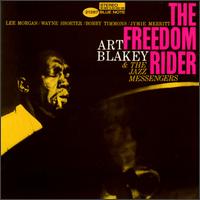
The Freedom Rider is an album by jazz drummer Art Blakey and his group the Jazz Messengers, recorded in 1961 and released in 1964 by Blue Note Records. Continuing Blakey's distinct brand of hard bop, this album features compositions from Wayne Shorter, Lee Morgan, Blakey himself, and Kenny Dorham, a former Jazz Messenger. This was the final album by this particular edition of the Jazz Messengers, who had been together for 18 months, as Lee Morgan left after this album and was replaced by Freddie Hubbard.

Free for All is a jazz album by Art Blakey & the Jazz Messengers released on Blue Note. Recorded in February 1964, it was released the following year. It was originally titled Free Fall.

Takin' Off is the debut album by jazz pianist Herbie Hancock released in 1962 by Blue Note Records. The album features veteran tenor saxophonist Dexter Gordon, trumpeter Freddie Hubbard, bassist Butch Warren and drummer Billy Higgins. The album is a creative example of music in the hard bop idiom. The bluesy track "Watermelon Man" made it to the Top 100 of the singles charts, and went on to become a jazz standard. Hancock released a funk arrangement of “Watermelon Man” on his 1973 album Head Hunters. Takin' Off was initially released on CD in 1996 and then again in remastered form in 2007 by Rudy Van Gelder.

Roots & Herbs is a jazz album by Art Blakey & the Jazz Messengers, recorded in 1961 at the same sessions which produced The Freedom Rider, but not released on the Blue Note label until 1970. The CD reissue features three alternate takes, two of which originally released in 1979 on Pisces.

V.S.O.P. is a 1977 double live album by keyboardist Herbie Hancock, featuring acoustic jazz performances by the V.S.O.P. Quintet, along with jazz fusion/jazz-funk performances by the ‘Mwandishi’ band and The Headhunters.

Caravan is a jazz album released by Art Blakey and the Jazz Messengers in February 1963. It was Blakey's first album for Riverside Records after he signed with them in October 1962. The songs were recorded at the Plaza Sound Studio in New York City, on October 23–24, 1962 The producer was Orrin Keepnews who also supervised the album's remastered re-release on CD.
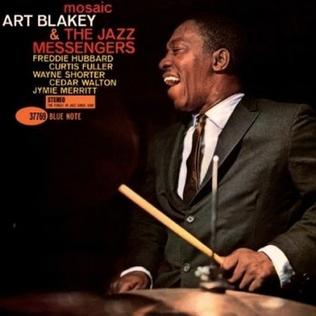
Mosaic is a studio album by Art Blakey & the Jazz Messengers recorded for Blue Note on October 2, 1961 and released the following year. The sextet features horn section Wayne Shorter, Freddie Hubbard and Curtis Fuller and rhythm section Cedar Walton, Jymie Merritt and Art Blakey.

Buhaina's Delight is a jazz album released by Art Blakey and the Jazz Messengers in 1963. Produced by Alfred Lion, the album was recorded in two sessions on November 28, 1961 and December 18, 1961 at Van Gelder Studio in Englewood Cliffs, New Jersey. The album was released by Blue Note Records in July 1963 after Blakey had moved to Riverside Records in late 1962.
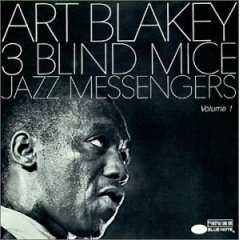
Three Blind Mice is a 1962 jazz album released by Art Blakey and The Jazz Messengers on the United Artists Jazz label, featuring live material recorded in 1962 Club Renaissance, Hollywood. It was reissued later in 1962 in two volumes by Blue Note Records, adding two tracks recorded in 1961 at The Village Gate and also unreleased material from the primary session. It was bassist Jymie Merritt's final recording with the group before having to leave to recover from an illness; he would be replaced by Reggie Workman.
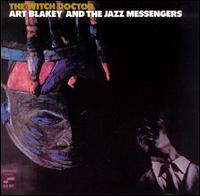
The Witch Doctor is an album by American jazz drummer and bandleader Art Blakey and his group The Jazz Messengers, recorded on March 14, 1961 and released in 1967 by Blue Note Records. It features performances by Blakey with Lee Morgan, Wayne Shorter, Bobby Timmons, and Jymie Merritt.

Like Someone in Love is an album by Art Blakey and The Jazz Messengers. It was recorded in August 1960, at the same sessions which produced A Night in Tunisia, but was released on Blue Note only in August 1967. It features performances by Blakey with Lee Morgan, Wayne Shorter, Bobby Timmons, and Jymie Merritt.
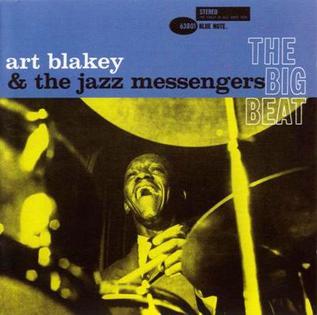
The Big Beat is an album by Art Blakey & the Jazz Messengers recorded on March 6, 1960 and released on Blue Note later that year. The quintet features horn section Lee Morgan and Wayne Shorter and rhythm section Bobby Timmons, Jymie Merritt and Blakey.

Ready for Freddie is an album by trumpeter Freddie Hubbard, released on the Blue Note label in 1962 as BLP 4085 and BST 84085. In 2003, it was remastered and issued on CD with the addition of two alternate takes. It contains performances by Hubbard, Bernard McKinney, Wayne Shorter, McCoy Tyner, Art Davis and Elvin Jones.
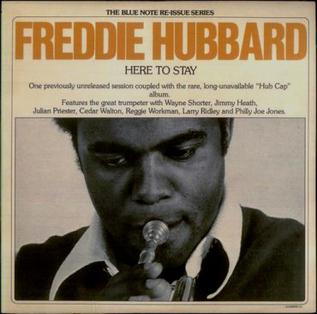
Here to Stay is a studio album by American jazz trumpeter Freddie Hubbard recorded on December 27, 1962, but not released on the Blue Note label until 1976 as BN-LA 496-2. It features performances by Hubbard, Cedar Walton, Reggie Workman, Philly Joe Jones, and Wayne Shorter.

Topsy – Standard Book is an album by trumpeter Freddie Hubbard recorded in December 1989 and released on the Japanese Alfa Jazz label. It features performances by Hubbard, Benny Green, Carl Allen, Rufus Reid and Kenny Garrett.
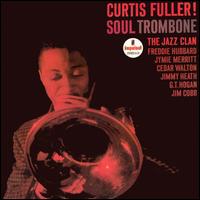
Soul Trombone is an album by American jazz trombonist Curtis Fuller featuring performances recorded in 1961 for the Impulse! label.

Drums Unlimited is an album by American jazz drummer Max Roach recorded in 1965 and 1966 and released on the Atlantic label.




















